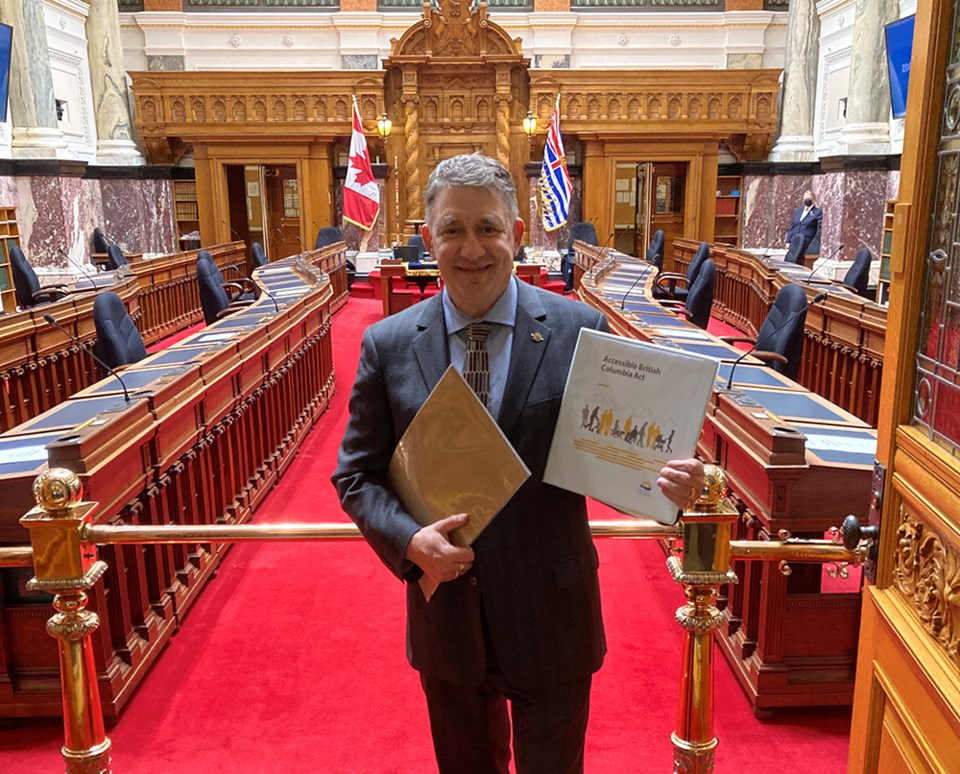As minister of social development and poverty reduction, Powell River–Sunshine Coast MLA Nicholas Simons tabled his first piece of legislation, the Accessible British Columbia Act, in the legislature on April 28.
The new accessibility legislation is designed to set BC on the path to being a more accessible and inclusive province for people with disabilities and their support networks.
If passed, the act will allow the government to establish accessibility standards aimed at identifying, removing and preventing barriers to accessibility and inclusion. Standards will be developed in a range of areas such as employment, delivery of services and the built environment.
“We’re committed to improving the lives of people living with disabilities, and the introduction of the Accessible British Columbia Act marks an important step in building an accessible province that works for all of us,” said Simons. “To be a truly inclusive province, we must integrate accessibility into all aspects of our lives. This legislation will support the development of new accessibility standards, which will help ensure all British Columbians can participate more fully in their communities.”
Simons said the legislation is long-awaited and long hoped-for. He said he is hoping the act will help people realize the goal is to make BC inclusive and accessible. According to BC government statistics, in 2017, there were an estimated 926,100 British Columbians, more than 20 per cent of the population, who reported having a disability.
“With this legislation I think about the people who have been advocating for improvements in our province, such as Powell River advocate Gerry Braak, and others, who have been pushing for accessibility legislation for a long time,” said Simons.
Simons said the legislation is an enabling act that allows the government, in the spirit of the United Nations Convention on the Rights of Persons with Disabilities, to create standards in different sectors, such as health, education and built environment, among other areas, which the government hopes people aspire to. He said the first step that needs to be undertaken is to set up a body that will determine where to start and where the first steps have to be made.
“I’m looking forward to being a big part of that,” said Simons.
“It could have an impact on improving access to places, improving access to education, and improving access to employment.
“The breadth of the impact has yet to be determined but will be done in the next phase of the process. This legislation allows the government to set up a provincial advisory committee that will be key to consulting with the diverse disability community. The principle of nothing about us without us will continue to underscore our development of standards and regulations.”
Consultation will be broad, says minister
Simons said it will be a broad consultation and will be careful work because the government wants to get it right.
“We want to make sure the voices of people with disabilities are central to the development of those standards,” said Simons.
The public consultation leading up to the legislation has been broad, according to Simons. He said in 2019, government, with the diverse community concerned about accessibility, came up with expectations of what would come in the legislation.
“The consensus from those who have been involved, along with the ministry secretariat on accessibility, is that they are happy this legislation will be potentially quite broad and potentially quite impactful in the lives of people who are living with disabilities,” said Simons. “The broad expectation with the legislation is what we are going to do with the standards development, which is coming next and will identify, remove and ultimately prevent barriers to access in the province.
“My hope is that people see this legislation development, or the development of the standards, as a way of reflecting expectations of British Columbians on how accessible the province is to people of all abilities. I hope it will have a very positive impact on inclusion in our province.”


